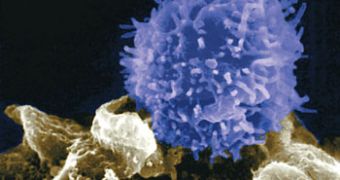A team of researchers writing in the journal Science Translational Medicine maintain that a novel form of gene therapy has succeeded in curing a patient's allegedly incurable acute lymphoblastic leukemia in a matter of days.
More precisely, they claim that this 58-year-old individual's body became completely free of cancer cells in just 8 days.
By means of genetic engineering, the researchers who cured him compelled the patient's T cells (i.e. a type of white blood cells) to track down and destroy the cancerous cells they happened to come across.
The cancerous cells targeted by these modified T cells all expressed a protein known as CD19, something that allowed said white blood cells to locate them with a high degree of efficiency.
Thus, this novel form of gene therapy basically comes down to identifying a molecule unique to the cancer cells one is trying to destroy and then “teaching” the body's own white cells to recognize that molecule and destroy the cell responsible for producing it.
New Scientist informs us that, apart from David Apointe, who was cured in just little over a week, four other patients were treated for their leukemia in this manner.
All four of them became cancer-free in roughly 8 weeks, yet two eventually passed away because of a blood clot unrelated to the cancer and as a result of relapsing, respectively.
However, it appears that three patients who survived have now been in remission for a period of 5 months – 2 years.
“Although it's early days for these trials, the approach of modifying a patient's T-cells to attack their cancer is looking increasingly like one that will, in time, have a place alongside more traditional treatments,” argued Paul Moss, a specialist currently working with Cancer Research UK.
The researchers who managed to rid these patients of their leukemia are now planning to roll out a second clinical trial, during which they wish to look into the possibility of using gene therapy in order to tackle other forms of cancer as well.

 14 DAY TRIAL //
14 DAY TRIAL //